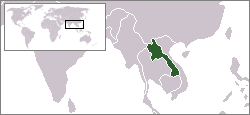Lao Issara
| Kingdom of Laos | ||||||||||
|
ພຣະຣາຊອານາຈັກລາວ Phra Ratxa A-na-chak Lao |
||||||||||
| Provisional government (1945–1946), Government-in-exile (1946–1949) | ||||||||||
|
||||||||||
|
Anthem Pheng Xat Lao Hymn of the Lao People |
||||||||||
| Capital | Vientiane (official), Luang Prabang (ceremonial) | |||||||||
| Capital-in-exile | Bangkok | |||||||||
| Languages | Lao (official), French | |||||||||
| Religion | Theravada Buddhism | |||||||||
| Government | Constitutional monarchy (1945), Provisional government (1945–1946), Government-in-exile (1946–1949) | |||||||||
| King | ||||||||||
| • | 1945 | Sisavang Vong | ||||||||
| Prime Minister | ||||||||||
| • | 1945 | Phetsarath (first) | ||||||||
| • | 1945–1949 (in exile) | Phaya Khammao (last) | ||||||||
| Historical era | World War II | |||||||||
| • | Independence declared | 8 April 1945 | ||||||||
| • | Constitution | 12 October 1945 | ||||||||
| • | French restoration | 24 April 1946 | ||||||||
| • | Disestablished | 24 October 1949 | ||||||||
| Currency | Lao kip | |||||||||
|
||||||||||
| Today part of |
|
|||||||||
The Lao Issara (“Free Laos”) was an anti-French, non-communist nationalist movement formed on October 12, 1945 by Prince Phetsarath. This short-lived movement emerged after the Japanese defeat in World War II and became the government of Laos before the return of the French. It aimed to prevent the French from restoring their control over Laos. The group disbanded in 1949.
Towards the end of the Japanese Occupation of Laos in 1945, when the Japanese were losing the war against the Allied Powers, the Japanese pressured the Lao King Sisavang Vong to declare the independence of Laos on 8 April.
Following the Japanese surrender on August 15, 1945, Prince Phetsarath made an attempt to convince the King to officially unify the country and declare the treaty of the French Protectorate invalid because the French had been unable to protect the Lao from the Japanese. However, King Sisavang Vong said that he intended to have Laos resume its former status as a French colony.
In October 12, 1945, supporters of Laotian independence announced the dismissal of the king and formed the new government of Laos, the Lao Issara, to fill up the power vacuum of the country.
For six months, the Lao Issara government attempted to exercise its authority by establishing a defense force under the command of Phetsarath’s younger half-brother Souphanouvong, with the assistance from the Viet Minh government of Ho Chi Minh and the Chinese forces.
However, two events opened the way for the French reconquest of Laos: the modus vivendi agreed between Ho Chi Minh and the French government on 6 March 1946, and the agreement of withdrawal of Chinese forces. This left the Lao Issara government alone to fend for itself, and it became militarily weaker in comparison to the French.
...
Wikipedia


